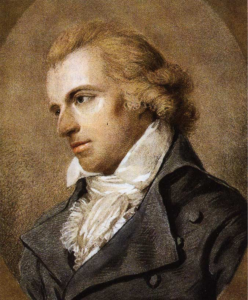The girl´s lament
(Poet's title: Des Mädchens Klage)
Set by Schubert:
D 6
[1811 or 1812]
D 191
[May 15, 1815]
D 389
[March 1816]
Der Eichwald braust,
Die Wolken ziehn,
Das Mägdlein sitzt
An Ufers Grün,
Es bricht sich die Welle mit Macht, mit Macht,
Und sie seufzt hinaus in die finstre Nacht,
Das Auge von Weinen getrübet.
“Das Herz ist gestorben,
Die Welt ist leer,
Und weiter gibt sie
Dem Wunsche nichts mehr,
Du Heilige, rufe dein Kind zurück,
Ich habe genossen das irdische Glück,
Ich habe gelebt und geliebet.”
Es rinnet der Tränen
Vergeblicher Lauf,
Die Klage, sie wecket
Die Toten nicht auf,
Doch nenne, was tröstet und heilet die Brust
Nach der süßen Liebe verschwundener Lust,
Ich, die Himmlische, will’s nicht versagen.
Lass rinnen der Tränen
Vergeblichen Lauf,
Es wecke die Klage
Den Toten nicht auf,
Das süßeste Glück für die trauernde Brust,
Nach der schönen Liebe verschwundener Lust,
Sind der Liebe Schmerzen und Klagen.
The oak forest is roaring,
The clouds are moving,
The girl is sitting
On the green bank,
The wave is breaking with force, with force,
And she sighs out in the dark night,
Her eye clouded with weeping.
“My heart is broken,
The world is empty,
And it no longer
Grants wishes any more.
You holy one, call your child back.
I have tasted earthly happiness
I have lived and loved.”
The tears flow
Their pointless course;
The lament does not
Wake the dead up.
But what is it that comforts and heals the breast
After the disappearance of the joy of sweet love?
I, the heavenly one, will not deny it.
Let the tears flow
Their pointless course;
The lament will not
Wake the dead up.
The sweetest blessing for the grieving breast
After the disappearance of the joy of beautiful love
Are the pains and laments of love.
All translations into English that appear on this website, unless otherwise stated, are by Malcolm Wren. You are free to use them on condition that you acknowledge Malcolm Wren as the translator and schubertsong.uk as the source. Unless otherwise stated, the comments and essays that appear after the texts and translations are by Malcolm Wren and are © Copyright.
☙
Themes and images in this text:
By water – river banks Chest / breast Clouds Emptiness and fullness Eyes Green Hearts Night and the moon Oak trees Running and races Sweetness Tears and crying Waves – Welle Wind
This lament appears in Act III, Scene 7 of ‘Die Piccolimini’. According to Schiller’s stage direction, Thekla ‘falls into’ singing this song after playing a melancholy prelude on a guitar. There has just been a confrontation between her aunt, the Countess Terzky (Wallenstein’s sister), and the man she is in love with, Max Piccolomini. On hearing voices approach they both leave Thekla alone, so the lament has no audience other than those watching the play. Schiller presumably wants to give the impression that this is a song that Thekla knows well. The girl in the lament is not Thekla herself, though of course she identifies with her and uses her experience as a source of solace. The song has echoes of Desdemona’s ‘Willow Song’:
My mother had a maid called Barbary,
She was in love, and he she loved proved mad
And did forsake her. She had a song of ‘willow’,
An old thing ’twas, but it expressed her fortune
And she died singing it. That song tonight
Will not go from my mind. I have much to do
But to go hang my head all at one side
And sing it like poor Barbary.
Shakespeare, Othello Act IV Scene 3 lines 24-31 (Arden 1996 ed)
Although Thekla’s love has not forsaken her, she feels that family opposition will be insuperable, so her love, as in the text of the girl’s lament, has vanished. She can only console herself with the comfort offered by the pain and lamentations that inevitably follow ‘the disappearance of sweet love’. Thekla finds comfort in the words of the girl herself, sitting by a raging river as the wind drives the clouds across the sky and roars through an oak wood, and in the words of ‘the holy one’ (the Madonna?), who reassures her that pain and lamentations are the only remedy for her condition.
☙
Original Spelling Des Mädchens Klage Der Eichwald braust, Die Wolken ziehn, Das Mägdlein sitzt An Ufers Grün, Es bricht sich die Welle mit Macht, mit Macht, Und sie seufzt hinaus in die finstre Nacht, Das Auge von Weinen getrübet. "Das Herz ist gestorben, Die Welt ist leer, Und weiter giebt sie Dem Wunsche nichts mehr, Du Heilige rufe dein Kind zurück, Ich habe genossen das irdische Glück, Ich habe gelebt und geliebet!" Es rinnet der Thränen Vergeblicher Lauf, Die Klage, sie wecket Die Todten nicht auf; Doch nenne, was tröstet und heilet die Brust Nach der süßen Liebe verschwundener Lust, Ich, die Himmlische, will's nicht versagen. Laß rinnen der Thränen Vergeblichen Lauf, Es wecke die Klage Den Todten nicht auf! Das süßeste Glück für die trauernde Brust, Nach der schönen Liebe verschwundener Lust, Sind der Liebe Schmerzen und Klagen.
Confirmed by Peter Rastl with Musen-Almanach für das Jahr 1799, herausgegeben von Schiller. Tübingen, in der J.G.Cottaischen Buchhandlung, pages 208-209; with Gedichte von Friederich Schiller. Erster Theil. Leipzig, 1800. bey Siegfried Lebrecht Crusius, pages 67-68; and with Gedichte von Friederich Schiller. Erster Theil. Zweite von neuem durchgesehene Auflage. Leipzig, 1804. bei Siegfried Lebrecht Crusius, pages 67-68.
First published 1799 in Schiller’s Musen-Almanach, and later, only stanzas 1-2 (with slight textual modifications and a different line break), in Die Piccolomini, act 3, scene 7 (Thekla’s song).
To see an early edition of the text, go to page 56 [62 von 292] here: http://digital.onb.ac.at/OnbViewer/viewer.faces?doc=ABO_%2BZ207858202


